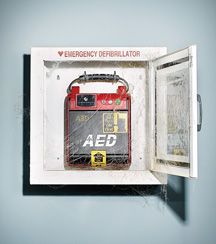A 911 Registry for AEDs
Emergency dispatchers should be able to direct a caller to a public AED
Elliot R. Fisch, president of Atrus], a company in Florida, has posted an interesting comment to our March story on the performance problems of public defibrillators, known as AEDs. Our story mentions that the FDA is considering tightening its regulation of the industry and that AEDs may one day be integrated into a next-generation nationwide emergency response system.
Fisch argues that many of the benefits of such a system can be had right now. His company offers a national AED registry that he says costs nothing to the owners of the devices and provides two additional services. First, it lists AEDs’ locations, so 911 operators can point a Good Samaritan caller to one in time to save a person with sudden cardiac arrest. And second, the registry sends AED owners periodic reminders to perform routine maintenance.
Essentially, Atrus’ registry makes it easier and cheaper for businesses that post AEDs to comply with laws that 35 states have already passed. Compliance, Fisch says, needs such bolstering, because these laws are spottily enforced.
Philip E. Ross is a senior editor at IEEE Spectrum. His interests include transportation, energy storage, AI, and the economic aspects of technology. He has a master's degree in international affairs from Columbia University and another, in journalism, from the University of Michigan.
